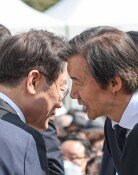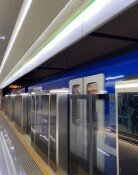Seoul should remember THAAD fiasco when considering tactical nukes
Seoul should remember THAAD fiasco when considering tactical nukes
Posted September. 11, 2017 07:49,
Updated September. 11, 2017 08:15
NBC news reported on Friday that the Trump administration is considering allowing redeployment of tactical nuclear weapons in South Korea and independent nuclear armament by the South and Japan. The idea was reportedly mentioned at an emergency National Security Council meeting presided by President Donald Trump on September 3, soon after North Korea’s sixth nuclear test. The American broadcast network said many people are regarding the redeployment of tactical nuclear weapons on the Korean Peninsula as a matter that is out of the question, but the Trump administration is poised to not rule out the measure if Seoul demands. Similar news reports were filed in March and April when tension mounted on the Korean Peninsula, but considering that the issue has now been put on the table at the U.S. National Security Council, there is a higher chance that the measure could become a policy option.
The South Korean presidential office and the ruling Minjoo Party expressed anew objection to the idea on Sunday, saying, “There is no change to the principle of denuclearization of the Korean Peninsula." However, just as South Korean Defense Minister Song Young-moo said at the National Assembly on Monday last week, the argument supporting the redeployment of tactical nuclear weapons is gathering significant momentum. According to the result of a Gallup Korea survey released on Friday, respondents who support the redeployment amounted to 60 percent, irrespective of their ideological beliefs or ages. According the result of a survey by the Korea Society Opinion Institute released on Sunday, 68.2 percent of South Koreans support redeployment of tactical nuclear weapons. Seoul will likely have to increase its contributions to South Korea-U.S. joint defense including costs for operation and improvement of nuclear warheads, but South Korea and the U.S. need reasonable negotiations based on close bilateral collaboration. The type of nuclear sharing in which the North Atlantic Treaty Organization (NATO) jointly operates the U.S.’ tactical nuclear weapons can also be an alternative option.
As the North’s Kim Jong Un regime appears poised to possess an ICBM armed with a nuclear warhead in the near future, the argument that the only way for the South to counter the North’s nuclear weapons is possession of nuclear weapons is gaining ground. Just as the Moon Jae-in administration changed its initial negative view of THAAD deployment, it is time for the administration to proactively consider this measure as well. Since this measure is an issue that is much more serious and graver than THAAD deployment, the Moon administration should be very careful to avoid Seoul-Beijing dispute and internal dispute within the South by applying the lessons learnt in the course of THAAD deployment.
South Korea's independent nuclear armament will entail too big ramifications and is a measure of last resort that Seoul should consider when facing the worst case situation. President Trump’s remark on his intention to allow for South Korea and Japan’s nuclear armament, which NBC reported, apparently aims at pressuring China, given that it was made in the process that Washington warned Beijing that unless China imposes stronger pressure on North Korea, Washington will not block (the two allies). However, considering that it is time South Korea needs a fundamental change to its security policy, Seoul can stay open to the possibility for this measure as well. Nuclear armament by South Korea and Japan will leave immense ramifications. China and Russia should keep in mind that if they are dragging their feet in imposing sanctions against Pyongyang, they will have no way to prevent a "nuclear domino."







